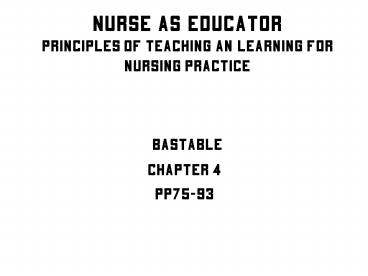Nurse as Educator Principles of Teaching an Learning for Nursing Practice Bastable PowerPoint PPT Presentation
1 / 14
Title: Nurse as Educator Principles of Teaching an Learning for Nursing Practice Bastable
1
Nurse as EducatorPrinciples of Teaching an
Learning for Nursing PracticeBastable
- Chapter 4
- pp75-93
2
Educators Role in Learning
- Assessing problems or deficits
- Identifying progress being made
- Providing appropriate information and presenting
it in unique ways - Giving feedback and follow-up
- Reinforcing learning in the acquisition of
knowledge, the performance of a skill, or a
change in attitude - Evaluating learners abilities
3
Assessment of the Learner
- Learning needs (what the learner needs to learn)
- Readiness to learn (when the learner is receptive
to learning) - Learning style (how the learner best
learns)
4
Assessing Learning Needs
- Learning needs gaps in knowledge that exist
between a desired level of performance and the
actual level of performance.
5
Assessing Learning Needs
- 6 steps to assessing learning needs
- Identify the learner
- Choose the right setting
- Collect data on the learner
- Include the learner as a source of information.
- Involve members of the healthcare team
- Prioritize needs
- Determine availability of educational resources
- Assess demands of the organization
- Take time-management issues into count
6
Methods to Assess Learning Needs
- Informal Conversations Open-ended questioning
for understanding. - Structured Interviews Higher thinking
questioning - Focus Groups 4-12 learners to determine areas of
educational needs - Self-Administered Questionnaires Written
responses to questions
7
Methods to Assess Learning Needs
- Tests Pretests can help identify current state
of knowledge. - Observations Watching and reflecting
- Patient Charts Written documentation
8
Assessing Learning Needs of Nursing Staff
- Written Job Descriptions What is required to
effectively carry out job responsibilities. - Formal and Informal Requests Educational
programs relevant to needs. - Quality Assurance Reports Trends in incident
reports. - Chart Audits Help identify trends in practice.
- Rules and Regulations Monitor new rules of
practice
9
Assessing Learning Needs of Nursing Staff
- 4-Step Appraisal of Needs
- Defining the target population
- Analyzing learner and organizational needs
- Analyzing the perceived needs of the learner and
comparing these to the actual needs - Using data to prioritize learning needs identified
10
Readiness to Learn
- Readiness to Learn as the time when the learner
demonstrates an interest in learning the type or
degree of information necessary to maintain
optimal health or to become more skillful in a
job. - Readiness to learn can be determined by the
learners characteristics as follows - Physical Readiness
- Emotional Readiness
- Experiential Readiness- Past experiences with
learning - Knowledge Readiness-
11
Physical Readiness
- Measures of Abilities level of using
muscles/movement - Complexity of Task difficulty level of task
- Environmental Effects conducive learning
environments are better - Health Status assessing energy level and comfort
level - Gender women take fewer risks in health care
12
Emotional Readiness
- Anxiety Level influences ability to perform
- Support System increases and decreases anxiety
- Motivation interest on achieving task
- Risk Taking Behavior-risk tendencies
- Frame of Mind concern about the here from now
- Developmental Stage peak time to learn
13
Experiential Readiness
- Level of Aspiration-extent person is driven
- Past Coping Mechanisms-how people have dealt with
previous problems - Cultural Background- sensitivity to other
cultures - Locus of Control- internally motivated to learn
or externally motivated - Orientation- tendency to adhere to a parochial or
cosmopolitan point of view
14
Knowledge Readiness
- Present Knowledge Base how much someone already
knows. - Cognitive Ability the extent to which
information can be processed. - Learning Disabilities possible special or
innovative teaching approaches. - Learning Styles how people learn best

